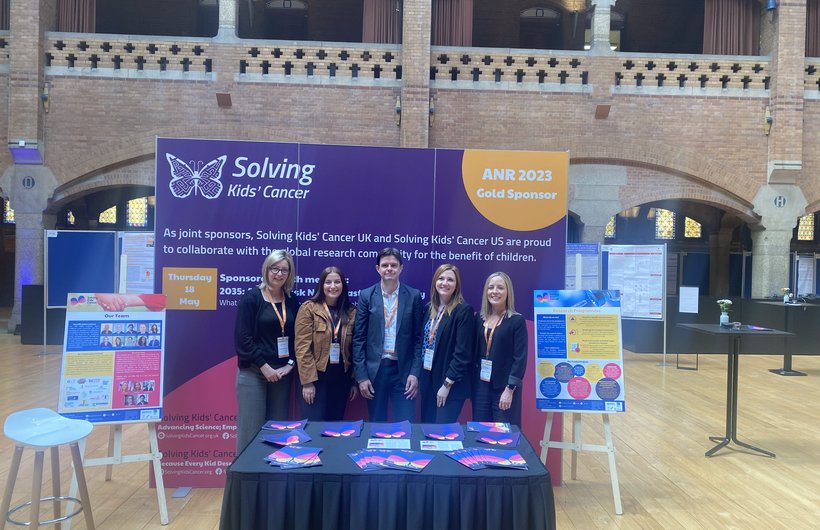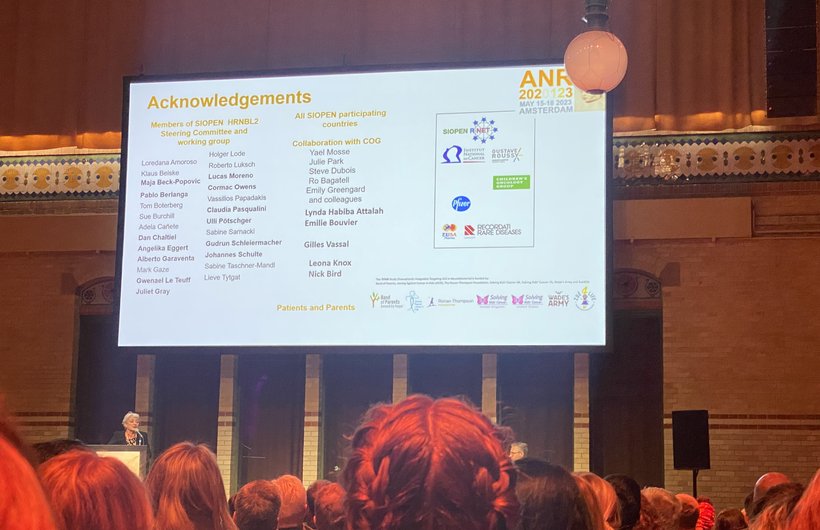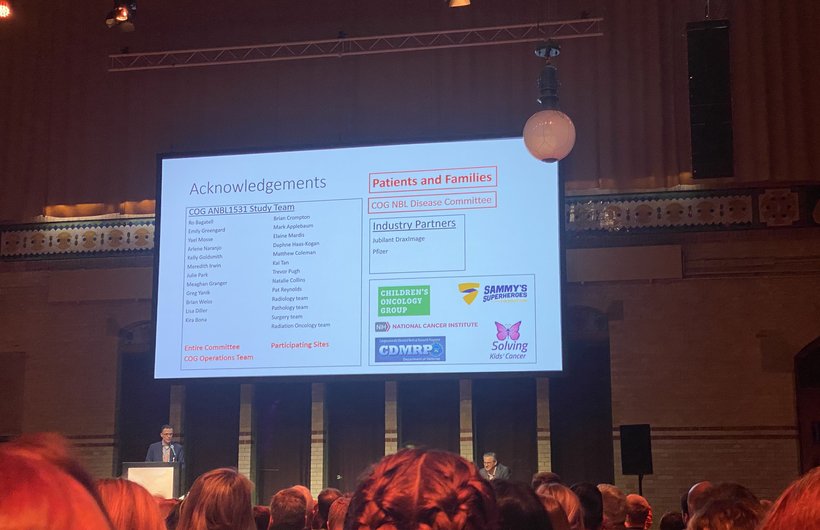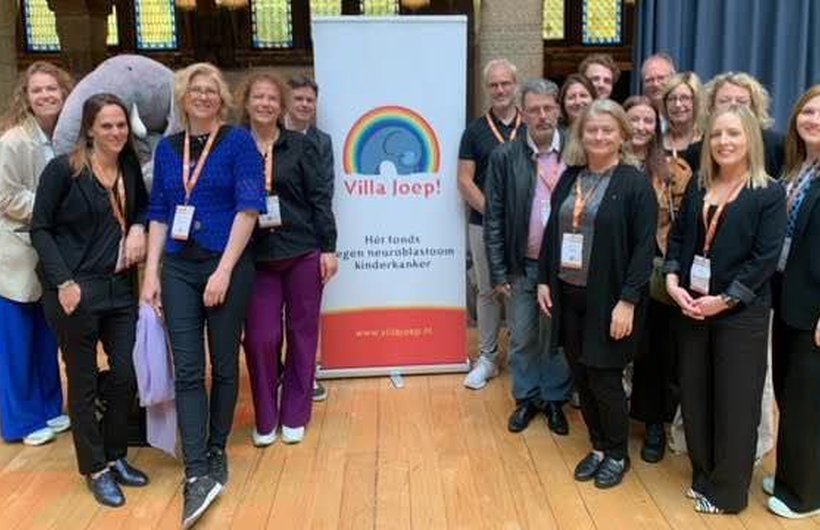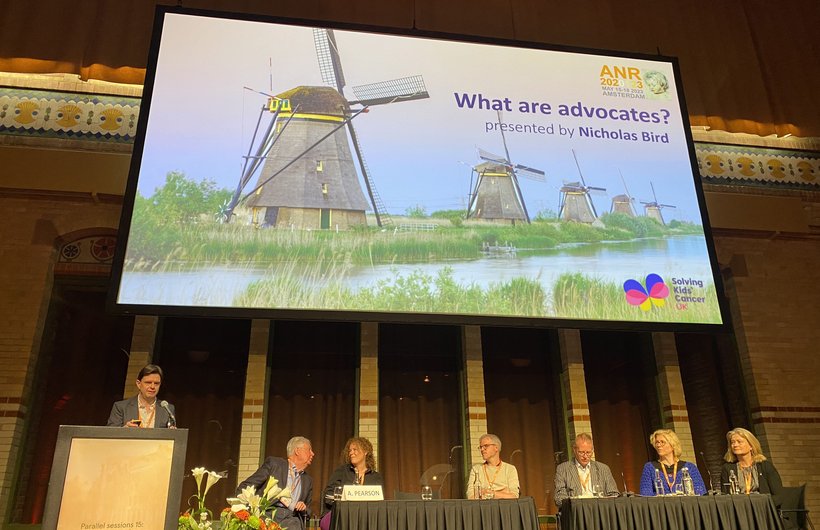Advances in Neuroblastoma Research conference 2023
Last month, Solving Kids’ Cancer UK was proud to be a Gold Sponsor of the 2023 Advances in Neuroblastoma Research (ANR) conference in Amsterdam, in partnership with our friends at Solving Kids’ Cancer US.
Across four days, there were over 100 presentations of cutting-edge research as well as several closed meetings and networking events. One of the great things about the ANR conference is that it brings together the whole of the neuroblastoma research community, from those working on biological studies in the lab, to clinicians who are treating children in hospital, and everyone in between. This is a great opportunity for researchers who are otherwise unknown to each other, to meet, collaborate and teach one another. It also gave us the chance to hear the highlights from every stage of the research life cycle.
Back to basics
The basics were covered in more ways than one at ANR 2023, with introductory educational sessions beginning each of the 4 days, as well as many presentations on so-called ‘basic science’ - in this sense meaning early biological studies on cells and tumour samples in the lab. As an organisation that focuses primarily on clinical research, we found it very insightful to get a better glimpse at what is going on at the lab bench. This is the work that paves the way for finding better treatments by working to understand why neuroblastoma behaves the way it does, and how we might be able to target and destroy it using small molecules that eventually become new drugs.
The drivers of relapse and treatment-resistant disease was one hot topic. Relapse and resistance pose perhaps the biggest challenges in treating high-risk neuroblastoma, so trying to find out what allows a tumour, or even small residual disease, to survive intensive therapies is key to developing medicines that will kill it completely. It was particularly exciting to see unpublished data from the Prof. Frank Westermann’s group which looked to finally confirm several genetic drivers for relapse in a robust and statistically significant way. This has previously been a challenge due to the small population numbers in neuroblastoma, and such a large number of sub-groups thanks to the extensive heterogeneity of the disease. We look forward to learning more about this once the data has been published.
Progress in the clinic
Most important to all the researchers working on neuroblastoma, is that their work will somehow bring positive change to children with neuroblastoma. This is where clinical research comes in, where new medicines are tested in trials on real patients. This type of research not only provides the data needed to prove that a new therapy is safe and effective, but also hope for those families who unfortunately run out of options in frontline therapy to treat their child’s cancer.
On day 2 at ANR, Dr Julie Park kicked off the talks with an update on the progress that’s been made in high-risk neuroblastoma thanks to clinical interventions including proper staging, genetic analysis and improved treatment regimens. We are all too aware however that more needs to be done- so it was great to hear the latest updates on the trials in Europe and North America that are looking to improve frontline treatment further. Dr Dominique Valteau shared the latest news on the SIOPEN High-risk Neuroblastoma 2 trial which is currently opening across the UK and Europe, whilst Dr Steve DuBois gave an overview on the equivalent COG trial, ANBL1531. Each of these talks included the TITAN study for ALK positive neuroblastoma that we’re funding through our 2018 international grant call and will be rolled out in these trials simultaneously in a landmark first. The picture of clinical trials wouldn’t be complete without looking at the landscape for relapsed and resistant neuroblastoma, which was covered by Dr Lucas Moreno who summarised the current approach to research in this area and what can be done to improve the rate of progress.
Overall, it was clear to see that an immense effort is being made by clinicians to find better ways to treat neuroblastoma, and we will always do as much as we can through research funding and advocacy to help this happen as quickly as possible.
Bringing everyone to the table
One of the major barriers to progress in such niche areas of research is achieving proper collaboration. When looking at childhood cancer, neuroblastoma appears to affect a small population, around 6 in 100 of all diagnoses, and there is huge variation in disease and outcome from child-to-child. This means that international partnerships are absolutely essential to conduct research that can be meaningful and have real-world impact for this small population.
We were therefore delighted to see over 800 members of the community come together. More importantly, even at a conference that focuses very heavily on technical science, there was a clear space for the involvement of advocates and patient representatives like SKC UK. We are strong supporters of truly multistakeholder collaboration in childhood cancer research, as we believe that everyone should have an equal seat at the table if we are to make progress that truly benefits children and their families.
It was refreshing to feel this same attitude amongst the organisers and attendees at ANR. For the first time in the history of the conference, advocates were a part of the main agenda with a talk titled: How patient advocates can help improve the survival of children with neuroblastoma. We were proud to see our own Chair of Trustees Nick Bird share his views on advocacy in this session, alongside our friends at Zoe4Life, Villa Joep and Neuroblastoma UK. As well as this open session, we were pleased to be able to hold a closed meeting during ANR with all the patient organisations in attendance, where we each shared our vision and goals and discussed opportunities for future collaboration to unite the global neuroblastoma charity community.
A true force for good
The whole research team came away with a hugely positive outlook on the current and future direction of neuroblastoma research. Within one conference hall, there were over 800 individuals who have dedicated their careers and are actively working on improving the future for children with neuroblastoma. From highly established researchers to young investigators, biologists to clinicians, there is a real commitment throughout this diverse global community to do better.
We are incredibly proud to be a part of this force for good, working with endless tenacity to see a future where no child dies of neuroblastoma or suffers due to the treatment they receive. This year’s ANR was an inspiring reminder that we are not alone in our fight against this devastating disease, and together we can win it.

